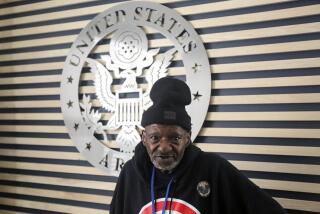World War II Veteran Finally Meets His Match
- Share via
NEW ORLEANS — On a street of fallen trees, a soldier stood tall outside the mud-swamped house where the body of Walter Zumpe lay face down on a sofa.
Troops are dispatched to many New Orleans homes where the dead of Hurricane Katrina await removal. The mission and the mood on Burbank Drive were different, however, because Zumpe, 85, was a decorated World War II veteran.
“You take care of your own,” said National Guard Sgt. Derek Stirk, the sentry at Zumpe’s front yard, a tangle of snapped branches and blown-out window screens. “We wouldn’t want him to be left here alone.”
But Zumpe, or his remains, had been alone for 2 1/2 weeks, until Stirk’s fellow Massachusetts guardsmen entered the home Thursday.
Their discovery ended a vigil that has been repeated again and again in the disaster zone, with loved ones of the missing enduring days and now weeks of no news.
In the case of Zumpe, a headstrong former POW who refused his family’s pleas to evacuate before Katrina struck, a wide network of relatives and friends spent 15 days beseeching authorities to look for him.
“The waiting is an ordeal that should not have to be borne,” said Zumpe’s widow, June Cassidy Zumpe, who was staying in a hotel in Hattiesburg, Miss., about 110 miles north of New Orleans. “It’s inexcusable, with all the agencies here, to not be able to get somebody in there sooner.”
Federal Emergency Management Agency spokesman Bill Lehman said recovery crews were retrieving bodies as quickly as they could. “It’s a monumental task,” he said.
Zumpe’s family and friends said they had called the American Red Cross, the Salvation Army, the Louisiana State Police and FEMA, among others. They posted his photograph on websites devoted to those lost in the storm.
George and Sharon Leidenheimer, longtime friends of Zumpe’s, contacted the Army’s 82nd Airborne Division, which has rescued scores of people stranded in New Orleans.
“Nothing transpired,” said George Leidenheimer, who served in the 82nd Airborne during World War II.
Then, last Monday, when the single-story brick front was still eaves-deep in dark floodwaters, paratroopers from the 82nd reached the house in a Zodiac boat. They knocked holes in the roof and ceilings but found no trace of Zumpe, said Capt. John Carson.
“No signs of anyone trying to survive -- no water bottles, food, blankets,” Carson said.
That report came as a blow, June Zumpe said, but it did not extinguish the hope that her husband had somehow cheated death, as he had as an Army Air Forces pilot, when he was shot down over Hungary.
Perhaps he was in a corner of the house, in a nook the paratroopers had not seen. Or he could be high and dry in a neighbor’s attic.
The morning before the storm, Jane Chaffin, who lives next door, said she had given him her life preserver.
“We were getting ready to leave,” she said through tears. “He said he would go up into the attic.... If we had known what was going to happen, we would have dragged him out of there.”
Two days later, from her mother’s home in Florida, Chaffin and her husband, Joel, began calling the Coast Guard and Louisiana emergency officials, asking that something be done for Zumpe.
They called and called.
“I know those people were starting to get tired of me,” she said.
On Thursday, family friend Edward “Rock” Temonia, who considered Zumpe an uncle, decided to search the house himself. “I couldn’t take it anymore -- 2 1/2 weeks,” said Temonia, a New Orleans locksmith who drove seven hours from his temporary home in Panama City, Fla. He called FEMA to beg for help a final time.
The call apparently worked. When Temonia arrived at the house, he saw the guardsmen there. They had just come across the body in the den, in a jumble of tossed furniture.
“It’s hard to think about how long he might have been in there, struggling to live,” Temonia said.
June Zumpe said her husband, a retired coffee executive, had a stubborn streak that developed particularly during his months in a Nazi prison camp.
“He’s never evacuated,” she said of previous hurricanes. “I knew this one was more serious, but when I left him, I didn’t think of him not surviving.”
Nor did Zumpe’s daughter and granddaughter, who also had urged him to leave.
“I spoke to him for about three hours,” said granddaughter Aimee Hayes, who had visited Zumpe the night before the hurricane. “He was just a very determined person.”
Hayes said she cleared the front yard of flower pots and garden tools that the winds could propel through the windows.
“I asked him if the attic stairs were OK, if he could get up them, and he said, ‘Yes,’” Hayes recounted. “I asked him if he had enough water, and he said, ‘I only drink coffee.’ And he had a lot of doughnuts and gumbo.”
Her voice thickened: “I’m still having nightmares -- of trying to figure out how to get him out of the house, putting ladders up.... Maybe he was up in the attic with his gumbo.”
After the body was found, another day would pass before FEMA arranged for its removal.
So Sgt. Stirk stood watch.
June Zumpe said her fallen soldier would have liked that.
More to Read
Sign up for Essential California
The most important California stories and recommendations in your inbox every morning.
You may occasionally receive promotional content from the Los Angeles Times.














